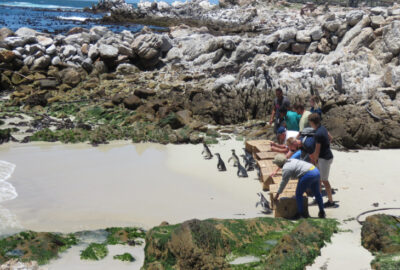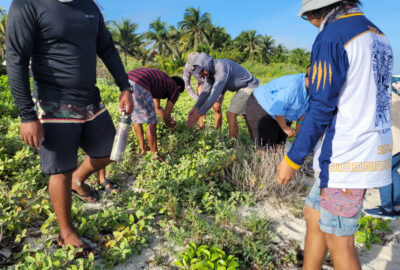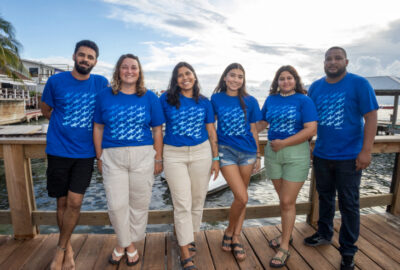We are SOLD OUT of tickets for today, Saturday July 5th.
In memoriam: Honoring Lenín Riquelme
By New England Aquarium on Wednesday, October 20, 2021

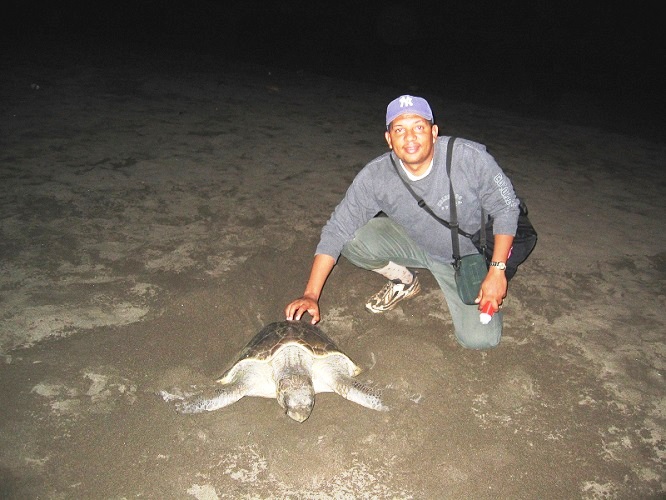
This post is one of a series of projects supported by the New England Aquarium’s Marine Conservation Action Fund (MCAF). Through MCAF, the Aquarium supports researchers, conservationists, and grassroots organizations around the world as they work to address the most challenging problems facing the ocean.
Lenín Riquelme was an MCAF grant recipient and researcher affiliated with Conservación, Naturaleza, y Vida (CONAVI) a Panamanian NGO dedicated to promote and enhance biodiversity conservation and sustainable management of natural resources. In this piece, MCAF social media intern Sofia Alli writes about Lenín’s research regarding the rapid assessment of incidental bycatch of leatherback sea turtles in honor of his memory and National Reptile Awareness Day.
Para la versión en español, haga clic aquí.
In memoriam: Honoring Lenín Riquelme, a guardian of the ocean
By Sofia Alli, MCAF social media intern
Lenín Riquelme approached the Marine Conservation Action Fund (MCAF) with a clear goal: to conduct research on the incidental bycatch of leatherback sea turtles in the Panama Bight. He was working with CONAVI Panama, a Panamanian NGO that encourages sustainable development of rural indigenous communities as well as to restore and preserve the natural habitats of Panama. Leatherbacks are considered a vulnerable species in the IUCN Red List, and Lenín realized that one key instrument in protecting them was not only protecting their nesting sites, but implementing policy to prevent one of their biggest threats: bycatch in fishing gear.
Bycatch, or incidental capture, is when fishers or commercial crews unintentionally catch non-target animals. Millions of marine animals are killed by bycatch every year. It is hard to prevent this from happening, but implementing policies to combat bycatch is a giant step.
In 2014, Lenín reached out to MCAF regarding funding for his research on incidental bycatch of leatherback sea turtles in the Panama Bight. The region provides nesting beaches and feeding spots for leatherback sea turtles as well as commercial and artisanal fishing opportunities. Nevertheless, with such a great biodiversity of life comes circumstances that can be less than favorable for the animals living there. The Panama Bight houses 530 registered commercial fishing watercraft and 7,000 registered artisanal watercrafts with active fishing licenses, meaning that more often than not, leatherback sea turtles are at great risk of incidental capture.
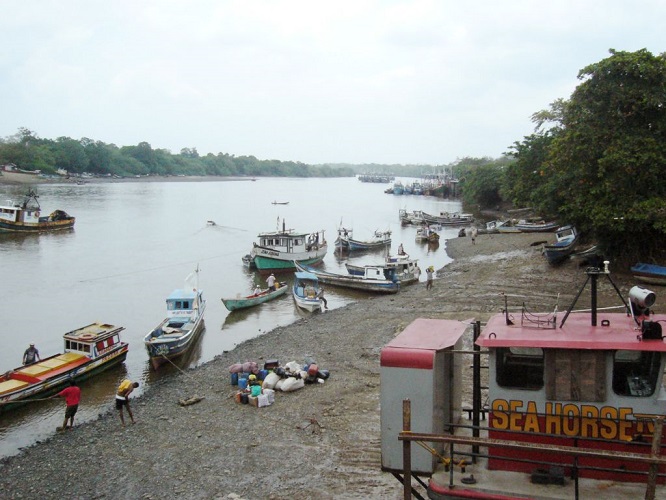
Lenín and his research team devised a plan to use port surveys and onboard observation to carry out the rapid assessment of bycatch rates. The information collected on these surveys was used to draft and implement protection measures. Lenín created a detailed analysis of the scope of incidental capture and promoted the use of environmentally-sound fishing technology among commercial and small fishing operations to further encourage these measures. He found that there were no reports on leatherback turtles incidentally caught when the project first began. His team researched and ultimately concluded that bycatch, in general, was severely under-reported in this region. He worked with several of Panama’s marine organizations to run 20 fisher training workshops. These workshops discussed incidental capture, unhooking and liberating entangled sea turtles, the adoption of a turtle excluder device, and conducting on-board assessments at sea.
The data collected from this project was then shared in the local and national media, government and civil society fora, and international symposia. The lessons from this project have been shared with fishing communities and local media and have reached relevant decision-makers in Panama.
This project was instrumental in creating the Cordillera de Coiba Marine Protected Area (MPA) in Panama. The creation of this MPA has allowed Panama to fulfill one of the Aichi targets of the United Nations’ Conventions on Biological Diversity. Lenín and his team laid the foundation for purposeful and enduring change to be made in this region. The education and research within this project will create a better and safer marine environment in the Panama Bight. Lenín wanted to create a haven for leatherback sea turtles, and through this project, he created a sanctuary for all marine biodiversity.
I found out about Lenín’s work with MCAF through my mother. She was looking through MCAF’s page and decided to see what projects they had funded in Panama, her home country. She was emotional when she saw her friend’s image on her screen. Lenín and my mother grew up in the same town in Panama and were a part of the same scholarship group that brought them to the United States. When she told me of their connection, I realized what a small world it truly is. Lenín passed away unexpectedly a few years ago in 2018; his legacy lives on through the conservation work he dedicated his life to in Panama. Lenín is remembered by all who knew him as a loyal friend, proud father of Lia and Mileny, and a dedicated professional working tirelessly to create a better world.

